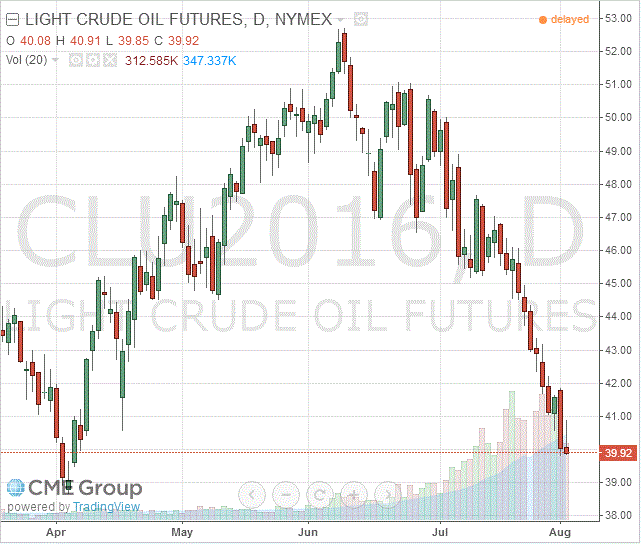- Analytics
- News and Tools
- Market News
- Oil continues to decline
Oil continues to decline
Oil prices rose more than 2 percent after falling by about $ 4 per barrel last week, but then went back into the red zone, as investors remain concerned about global oversupply.
Due to oversupply, Goldman Sachs note that in the near future should not expect the oil price recovery. "We expect that oil prices will remain in the area of $ 45 to $ 50 per barrel, at least until mid-2017, but it is necessary to take into account the existing risks".
"The market is continually focusing on oversupply, the bearish trend seems to be difficult to change in the near future", - said Hans van Cleef, ABN AMRO.
It is worth emphasizing that Brent oil futures fell nearly 21% from the highs reached in early June as expectations of increased exports from the Middle East and North Africa have raised concern that an excess of oil will reduce demand from refineries.
Some support was given from the weakening dollar, which potentially increases demand for oil, making it cheaper for buyers using other currencies.
Market participants are also waiting for data on US petroleum inventories. Later, a report of the American Petroleum Institute (API) will be published and official data from the Ministry of Energy will be known tomorrow. It is estimated that the Ministry of Energy reported that oil and gasoline declined last week to 1.75 million and 1 million barrels respectively, but nonetheless remained at very high levels for the current season.
The cost of the September futures on WTI fell to 39.92 dollars per barrel.
September futures price for North Sea petroleum mix of mark Brent fell to 41.55 dollars a barrel on the London Stock Exchange ICE Futures Europe.

© 2000-2026. All rights reserved.
This site is managed by Teletrade D.J. LLC 2351 LLC 2022 (Euro House, Richmond Hill Road, Kingstown, VC0100, St. Vincent and the Grenadines).
The information on this website is for informational purposes only and does not constitute any investment advice.
The company does not serve or provide services to customers who are residents of the US, Canada, Iran, The Democratic People's Republic of Korea, Yemen and FATF blacklisted countries.
Making transactions on financial markets with marginal financial instruments opens up wide possibilities and allows investors who are willing to take risks to earn high profits, carrying a potentially high risk of losses at the same time. Therefore you should responsibly approach the issue of choosing the appropriate investment strategy, taking the available resources into account, before starting trading.
Use of the information: full or partial use of materials from this website must always be referenced to TeleTrade as the source of information. Use of the materials on the Internet must be accompanied by a hyperlink to teletrade.org. Automatic import of materials and information from this website is prohibited.
Please contact our PR department if you have any questions or need assistance at pr@teletrade.global.















